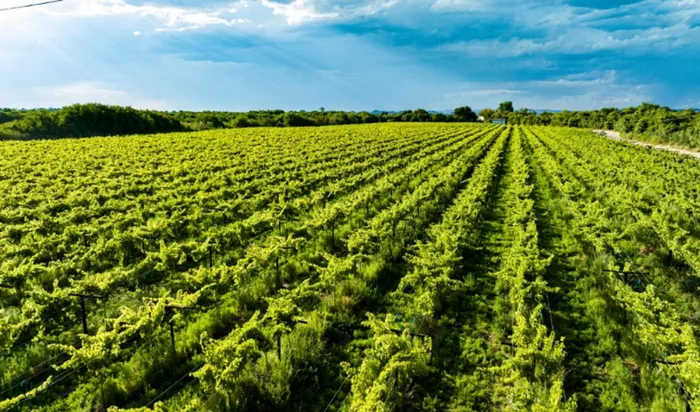Climate extremes reshaping the globe, Africa must respond decisively

Picture: Sproetniek via Getty Images Signature – Lush vineyards in the Augrabies region of the Northern Cape, symbolise growth and opportunity in an area usually seen as dry and uninviting.
The exploding ‘cost of living crisis’ has been identified by the World Economic Forum as the greatest threat to the global economy this year while the positioning of key countries in response to the turmoil in Ukraine suggest a possible new world order, even though the world is struggling to adapt to the worsening realities of 2023.
The destructive effects of climate change on the environment, economy, society, and security are the true catalyst for this confluence of crises.
Can Africa weather the storms and use these challenges as steppingstones to a more prominent role on the world stage?
Three African member states (A3) of the United Nations Security Council drafted a historic resolution on the relationships between climate and security in December 2021.
Niger and Ireland were major players in getting this resolution passed. However, Russia’s veto prevented its adoption. China didn’t vote and India was against it too. Gabon, Ghana, and Mozambique, the current A3, have nonetheless promised to keep at it.
There are three major questions that arise from this.
- When it comes to the development agenda, what exactly does the global climate discussion entail?
- How does the climate catastrophe affect the existing international system?
- How does the global climate catastrophe impact Africa’s and the world’s security framework?
According to Dhesigen Naidoo, senior research associate at the Institute for Security Studies (ISS) in Pretoria, Africa’s impact on global warming is substantial.
“Africa has developed a significant climate change footprint. Through Morocco, South Africa and Egypt, the Continent has hosted the UN Framework Convention on Climate Change Conference of the Parties (COPs). Several other African countries have been active in climate negotiations, and the African Group of Negotiators has always been a part of the COP landscape,” said Naidoo.
There is also reason for optimism in Africa’s climate governance environment. William Ruto, the president of Kenya, is in charge of the African Union’s climate change summit.
African leaders formed three climate commissions at COP 2016: the Sahel Climate Commission, the Island States Climate Commission, and the Congo Climate Commission.
Africa has also been a relative trailblazer in addressing the climate crisis. To discuss the connection between climate change and international stability, the African Union Peace and Security Council held a special session that year.
Climate Responses for Sustaining Peace was introduced during COP27 in Sharm El-Sheikh, an initiative led by Egypt, which held the COP27 presidency.
While this is happening, it is generally accepted that Africa is responsible for a disproportionate amount of climate change as the Continent makes a negligible impact on the production of greenhouse gases, carbon dioxide in particular.
But the climate disaster map of Africa is omnipresent. Extreme weather that was formerly unheard of is becoming more commonplace in some regions, leading to more severe floods, droughts, high-energy storms, heatwaves, and wildfires.
Increasingly overwhelming evidence suggests a relationship between climate risk and human security, which poses challenges for Africa’s development agenda. Among these is the issue of Africa’s fossil fuel wealth, estimated at $10 trillion.
As the Continent makes the shift to a low-carbon economy, this resource can no longer fuel growth on the Continent unless it is exported. However, that would merely represent a regional shift in where the greenhouse gases are coming from.
But there’s another option. Naidoo suggests the idea of the international community compensating Africa for forgoing the use of carbon-intensive assets.
It makes sense for the global north and quickly rising countries like China and India to engage in this ‘new carbon trade,’ as Africa is already bearing the weight of accumulated greenhouse gas emissions.
Loss and damage from subsequent catastrophe management adds unsustainable pressure to Africa’s limited resources. If a solution is not found, Africa will be forced to take advantage of the profit from its fossil fuel reserves in order to meet its commitments under the Sustainable Development Goals and prevent further poverty and underdevelopment.
Making use of profits derived from fossil fuels to fund the adoption of sustainable development policies and practices seems counterintuitive, because it is.
The issue of climate change brings into focus the necessity to determine whether the current global order and its monetary system are adequate.
In his 2020 Nelson Mandela Annual Lecture, UN Secretary-General António Guterres argued that global inequality was the actual epidemic, and that it was supported by a governance and financial infrastructure meant to maintain the supremacy of wealthy countries.
This was also made clear by Barbados’ Prime Minister Mia Mottley in her COP27 presentation, where she called for a major overhaul of the international monetary system using the Bridgetown Initiative as a viable mechanism.
That got people talking. Affordable climate mitigation and adaptation financing is essential for achieving a low-carbon and climate-resilient global society.
Reform of the multilateral system is gaining more and more support. Most of the developing world is under-represented on the UN Security Council, and with the exception of China, it has no permanent seats.
The United Nations (UN) needs to speed up its transformation in order to reflect the reality of the 21st century in terms of power dynamics and prevailing agendas.
Naidoo says that “the human, climate and environmental justice pathways must deliver peace and stability, end violent conflict and extremism, and recognise that we have incurred massive intergenerational debt.”
To drive a stronger global agenda, Africa requires a bottom-up effort. The pursuit of adequate reform at the international level to speed up climate-resilient sustainable development is crucial.
Goals for combating climate change should align with the Sustainable Development Goals. By doing so, we can craft low-carbon development pathways that lead to poverty eradication, increased opportunity for all people, and a narrowing of the global inequality gap.